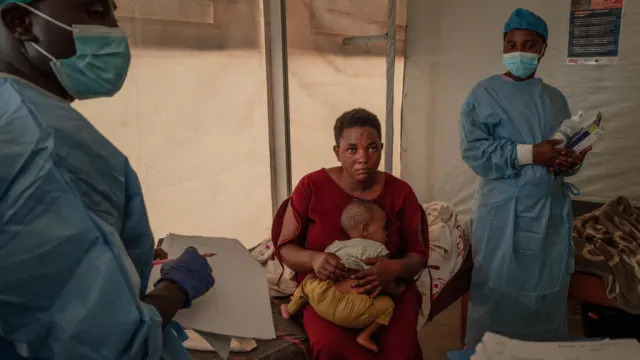The ongoing mpox outbreak in Africa has rapidly escalated into a significant public health crisis, marked by the emergence of a new, more deadly strain of the virus, known as Clade 1b. Since the beginning of the year, Africa has witnessed a surge in mpox cases, with 18,737 suspected or confirmed cases reported across the continent. This alarming figure includes 1,200 new cases in just one week, prompting international concern and a coordinated global response.
Mpox, formerly known as monkeypox, is a viral disease that was first detected in humans in the Democratic Republic of Congo (DRC) in 1970. It is related to the now-eradicated smallpox virus and can spread through close contact, such as touching, kissing, or sexual activity, as well as through contaminated materials like sheets, clothing, and needles. The disease typically begins with flu-like symptoms, including fever, chills, exhaustion, headache, and muscle weakness, followed by a painful or itchy rash with raised lesions that scab over and resolve over a period of weeks.
Historically, mpox has been endemic to Central and West Africa, with the majority of cases concentrated in the Congo Basin. However, the current outbreak is distinct in several critical ways. Notably, it involves multiple genetic clades of the virus, each with different characteristics and clinical outcomes. Clade I, which has caused more severe disease, is now driving the outbreak, with the subtype Clade 1b emerging as a particularly concerning variant due to its increased transmissibility and severity.
The emergence of Clade 1b in September 2023 in the DRC has significantly altered the trajectory of the mpox outbreak. This strain has caused widespread skin eruptions across the body, a departure from previous variants that typically caused localized lesions around the mouth, face, or genitals. Clade 1b is not only more deadly but also more transmissible, leading to a rapid increase in cases and deaths across the region.
The Democratic Republic of Congo has been the hardest hit, with all 26 provinces, home to some 100 million people, reporting cases. In just one week, the DRC reported 1,005 cases, including 222 confirmed and 783 suspected, and 24 deaths. The severity of the situation in the DRC is underscored by the fact that more cases have been reported since the beginning of the year than in all of 2023, which saw a total of 14,383 cases. The neighboring country of Burundi has also seen a dramatic rise in cases, with a 75% increase in one week, reporting 173 cases, of which 39 were confirmed and 134 suspected.
The rapid spread of Clade 1b and the associated increase in fatalities have prompted the World Health Organization (WHO) to declare an international health emergency, the highest level of alert under international health law. This declaration came on the heels of a public health emergency declared by the Africa Centers for Disease Control and Prevention (CDC) for the continent. The WHO’s decision reflects the growing concern over the potential for the virus to spread beyond Africa, especially as cases of mpox have been detected for the first time outside Africa in Sweden and Pakistan.

In response to the outbreak, the WHO and other global health organizations have called for a significant ramp-up in vaccine production and distribution. Vaccines against mpox are available, but they are not widely accessible in Africa, where they are most needed. The Vaccine Alliance, known as Gavi, has committed up to $500 million to supply mpox vaccines to countries affected by the outbreak, including the DRC and surrounding countries. Starting in 2026, Gavi plans to establish a global stockpile of mpox vaccines, similar to its existing stockpiles for cholera, Ebola, meningitis, and yellow fever vaccines.
The WHO has also developed a regional response plan that requires $15 million, with $1.5 million already released from the WHO Contingency Fund for Emergencies. This plan includes the Emergency Use Listing process for both mpox vaccines and a strategy to distribute the first half a million doses, with an additional 2.4 million doses potentially available by the end of the year. The DRC and Nigeria have been identified as the first countries to receive these vaccines, according to Dr. Abdou Salam Gueye, the African Regional Emergency Director.
Containing the spread of mpox, particularly the Clade 1b strain, presents significant challenges. While vaccines are a crucial part of the response, they are only one component of a broader strategy that must also include increased surveillance, improved diagnostics, and more extensive research to fill critical gaps in understanding the virus. Dr. Daniel Bausch, a senior adviser for global health security at FIND, a global nonprofit focused on health equity, emphasized the importance of these additional measures, noting that surveillance of mpox is currently incomplete, and much remains to be learned about the virus’s transmissibility and fatality risks.
One of the primary challenges in controlling the outbreak is the lack of proper diagnostics, especially in rural areas where the majority of cases occur. Dr. Bausch pointed out that while diagnosing mpox infection is relatively straightforward in well-equipped laboratories with skilled personnel, most cases are reported in remote regions where access to such facilities is limited. This diagnostic gap makes it difficult to accurately assess the true extent of the outbreak, as only the most severe cases are likely to be detected and reported.
Moreover, the overlapping nature of multiple outbreaks involving different clades of the virus complicates containment efforts. The WHO’s Director-General, Tedros Adhanom Ghebreyesus, highlighted this complexity, stating, “We are not dealing with one outbreak of one clade; we are dealing with several outbreaks of different clades in different countries with different modes of transmission and different levels of risk.” This multifaceted situation requires a tailored response that addresses the specific characteristics and risks associated with each clade and outbreak.
The international spread of mpox, particularly the new Clade 1b strain, is a cause for significant concern. WHO Director-General Tedros Adhanom Ghebreyesus described the risk of additional international spread as “very worrying,” noting that the current outbreak in Africa might be just the “tip of the iceberg.” The first case of Clade 1b outside Africa was reported in Sweden, underscoring the potential for the virus to spread globally, especially in the context of increased international travel.
The situation in Africa has drawn comparisons to the global mpox outbreak from July 2022 to May 2023, which was driven by Clade II and also declared a global health emergency. However, the current outbreak is more severe due to the involvement of Clade I, which has caused higher mortality rates in previous outbreaks. Some outbreaks of Clade I mpox have had fatality rates as high as 10%, although more recent outbreaks have reported lower death rates.
The global health community is closely monitoring the situation, particularly in high-income countries where the risk of widespread transmission is currently considered low. However, the WHO and other experts stress the importance of addressing the outbreak with urgency and ensuring that resources are allocated equitably across all affected regions. Dr. Bausch emphasized the need for early intervention, stating, “We’ve all heard a million times that no one’s safe till everyone’s safe.”
The response to the mpox outbreak is not only a matter of public health but also one of equity and human rights. The WHO’s decision to declare a global health emergency is partly driven by the need to ensure that the outbreak in Africa receives the same level of attention and resources as previous outbreaks in high-income countries. The global response to the 2022 mpox outbreak set a precedent for swift and coordinated action, and the current situation in Africa deserves no less urgency.

Addressing the outbreak effectively will require a comprehensive approach that goes beyond vaccine distribution. Increased surveillance, diagnostics, and research are essential to fully understanding the virus and controlling its spread. Additionally, there is a need for greater international solidarity and support to ensure that all affected countries, particularly those in Africa, have the resources and infrastructure necessary to combat the outbreak.
Conclusion
The mpox outbreak in Africa, driven by the emergence of the Clade 1b strain, represents a significant and ongoing public health challenge. With cases continuing to rise and the virus spreading to new regions, the global community must respond with urgency and a commitment to equity. Vaccines, while crucial, are only one part of the solution. Comprehensive surveillance, diagnostics, and research efforts are needed to contain the outbreak and prevent further spread.
The WHO’s declaration of an international health emergency is a critical step in mobilizing the necessary resources and attention to address this crisis. However, the true success of the global response will depend on the ability to ensure that all affected regions, particularly those in Africa, receive the support they need to protect their populations and prevent the further spread of this deadly virus. The ongoing outbreak serves as a clear reminder of the interconnectedness of global health and the importance of a coordinated, equitable response to emerging health threats.
SOURCES
- https://uk.news.yahoo.com/mpox-why-outbreak-concerning-203850335.html?guce_referrer=aHR0cHM6Ly93d3cuZ29vZ2xlLmNvbS8&guce_referrer_sig=AQAAACGv4zIfPZ_DZ1pim0LPcDMv63wG8dC2ArpROR6qov55VhmgmBao0GennyHpF3EzTmPVBzZ43lf37W5JOYc5bfQFFNtBBfUZrcYmRUzoVAgdzO7xaA-fH1DBUDnUhQU-Px0VFIsLQQafCifkE78p1sAiWOpWJlyqx-a8EW_YszPo&guccounter=2
- https://www.google.com/amp/s/english.alarabiya.net/amp/News/world/2024/08/17/more-than-18-700-mpox-cases-detected-in-africa-since-january-health-agency




